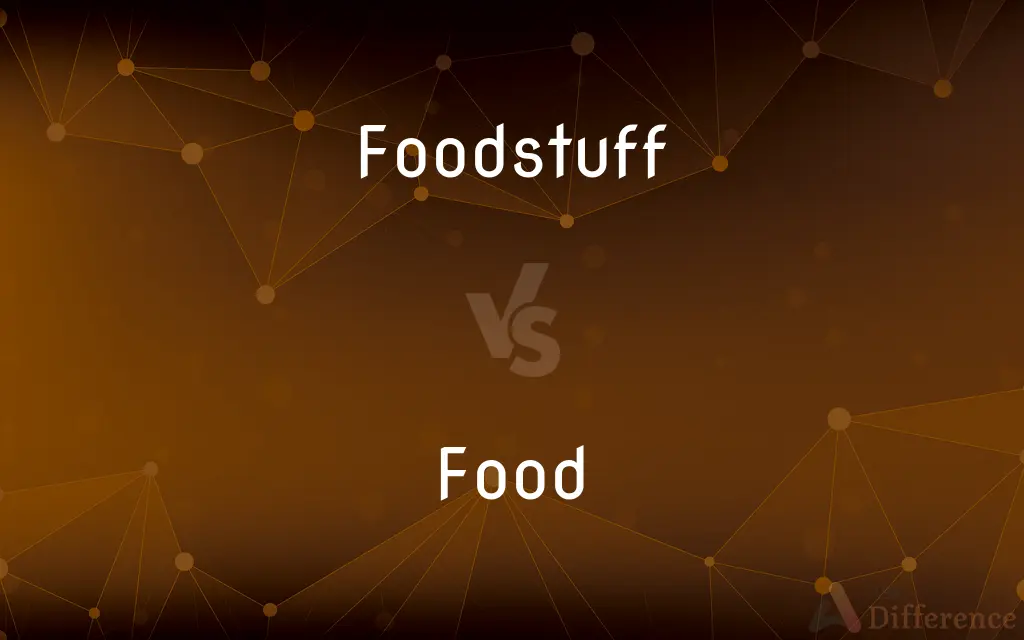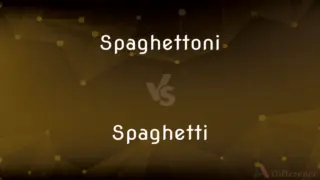Foodstuff vs. Food — What's the Difference?
By Tayyaba Rehman — Updated on November 7, 2023
Foodstuff refers to raw materials used to prepare food; food is any nutritious substance consumed for sustenance.

Difference Between Foodstuff and Food
Table of Contents
ADVERTISEMENT
Key Differences
Foodstuff typically denotes raw materials like flour, sugar, and rice, which require further preparation to become edible. On the other hand, food encompasses a broader category that includes prepared dishes, snacks, fruits, and vegetables that can be consumed as they are. Foodstuffs are ingredients, while food refers to the end product ready for consumption.
Foodstuff is a term more commonly used in the food industry and supply chain, focusing on the production and distribution of ingredients. Food, however, is a general term used daily to describe anything that is eaten to sustain life, providing energy and nutrition. Foodstuffs are the building blocks of food, the components that, when combined and cooked, become meals that can be enjoyed.
The usage of the word foodstuff often implies a commercial or industrial context, such as in manufacturing or retail. Food is a more universal term that is relevant in any context, from a home kitchen to a fine dining restaurant. While foodstuff may sound technical or formal, food is the more casual term that people use in everyday conversation.
When discussing nutrition, foodstuff can refer to a specific nutrient source, like protein or carbs, that is part of a larger dietary plan. In contrast, when people discuss food, they might be referring to taste, cultural significance, or the experience of eating. Therefore, while foodstuff might relate more to the component level, food is about the overall dietary intake.
Comparison Chart
Definition
Raw, basic ingredients for cooking or processing.
Any edible substance, including prepared dishes.
ADVERTISEMENT
Usage Context
Industrial, commercial, and supply chain sectors.
General, everyday context including home and dining.
State
Unprepared or semi-processed.
Ready-to-eat or requiring minimal preparation.
Example
Wheat, as a foodstuff, is milled into flour.
Pasta, as a food, is served with sauce and cheese.
Nutritional Aspect
Often discussed in terms of its potential contribution to food.
Discussed regarding its actual contribution to diet.
Compare with Definitions
Foodstuff
Items stocked by a grocer.
The foodstuff section at the market includes rice, beans, and lentils.
Food
Any product that can be digested.
The festival had a variety of food from different cultures.
Foodstuff
Commodities traded in food markets.
The price of the foodstuff like corn affects global economies.
Food
Items served during meals.
The restaurant’s food is known for its exquisite taste.
Foodstuff
Basic edible ingredients.
Wheat is an essential foodstuff in many countries.
Food
Edible items necessary for growth and health.
Fruits and vegetables are essential foods for a balanced diet.
Foodstuff
Raw materials for culinary use.
Sugar is a versatile foodstuff used in baking and confectionery.
Food
A meal or substance eaten for pleasure.
Chocolate is a favorite food among those with a sweet tooth.
Foodstuff
Any substance that can be used as food.
Quinoa is a nutritious foodstuff gaining popularity worldwide.
Food
Food is any substance consumed to provide nutritional support for an organism. Food is usually of plant, animal or fungal origin, and contains essential nutrients, such as carbohydrates, fats, proteins, vitamins, or minerals.
Foodstuff
A substance suitable for consumption as food
Rationing of staple foodstuffs was introduced
The people depend on sago starch as a basic foodstuff
Food
Any nutritious substance that people or animals eat or drink or that plants absorb in order to maintain life and growth
Music is food for the soul
Baby foods
Food shortages
We need food and water
They had eaten their food and slept
Foodstuff
A substance that can be used or prepared for use as food.
Food
Material, especially carbohydrates, fats, and proteins, that an organism uses for energy, growth, and maintaining the processes of life. Plants, algae, and some bacteria make their own food through photosynthesis, while animals and most other organisms obtain food by consuming other organisms or organic matter.
Foodstuff
A material that may be used as food.
Food
A specified kind of nourishment
Breakfast food.
Plant food.
Foodstuff
(usually plural) consumer goods sold by a grocer
Food
Nourishment eaten in solid form
Food and drink.
Foodstuff
A substance that can be used or prepared for use as food
Food
Something that nourishes or sustains in a way suggestive of physical nourishment
Food for thought.
Food
(uncountable) Any solid substance that can be consumed by living organisms, especially by eating, in order to sustain life.
The innkeeper brought them food and drink.
Food
(countable) A foodstuff.
Food
Anything that nourishes or sustains.
The man's inspiring speech gave us food for thought.
Mozart and Bach are food for my soul.
Food
What is fed upon; that which goes to support life by being received within, and assimilated by, the organism of an animal or a plant; nutriment; aliment; especially, what is eaten by animals for nourishment.
Food
Anything that instructs the intellect, excites the feelings, or molds habits of character; that which nourishes.
This may prove food to my displeasure.
In this moment there is life and foodFor future years.
Food
To supply with food.
Food
Any substance that can be metabolized by an organism to give energy and build tissue
Food
Any solid substance (as opposed to liquid) that is used as a source of nourishment;
Food and drink
Food
Anything that provides mental stimulus for thinking
Food
Substance consumed to provide nutritional support.
Salad is a healthy food rich in vitamins.
Common Curiosities
What is a foodstuff?
A foodstuff is a raw ingredient used to make food, like grains or vegetables.
Is all food considered foodstuff?
Not all food is considered foodstuff; foodstuff refers specifically to raw ingredients.
Does the term food include snacks and candy?
Yes, food includes all edible items, including snacks and candy.
Is foodstuff a modern term?
Foodstuff is a traditional term, but it’s still used in modern food industry contexts.
How do food and foodstuff relate to cooking?
Cooking often transforms foodstuff into food that’s ready to eat.
Can the term foodstuff apply to beverages?
Typically, foodstuff refers to solid items, but it can include liquid items like milk that are used as ingredients.
Is labeling different for foodstuff and food?
Yes, foodstuff labeling often focuses on the ingredient specifics, while food labels provide broader nutritional information.
How do you identify a foodstuff in a recipe?
In a recipe, a foodstuff is an ingredient that is combined with others to create a dish.
Can foodstuff be eaten directly?
Some foodstuffs can be eaten raw, while others need to be processed or cooked first.
How do food and foodstuff differ in a grocery store?
Foodstuff usually refers to the raw ingredients, while food includes all edible items, including prepared goods.
Are dietary restrictions concerned with foodstuff or food?
Dietary restrictions can apply to both foodstuff and food, depending on the context.
How do restaurants use the term foodstuff?
Restaurants buy foodstuff to create food, which is then served to customers.
Are foodstuffs only related to plant products?
No, foodstuffs can also include animal products like meat and eggs.
Is there a difference in the nutritional context between foodstuff and food?
Foodstuff might refer to the potential nutrients provided, while food refers to the actual nutritional value.
Can foodstuff be a finished product?
Typically, foodstuff is not a finished product, but some foodstuffs like nuts can be eaten as they are.
Share Your Discovery

Previous Comparison
Spaghettoni vs. Spaghetti
Next Comparison
Distil vs. DistillAuthor Spotlight
Written by
Tayyaba RehmanTayyaba Rehman is a distinguished writer, currently serving as a primary contributor to askdifference.com. As a researcher in semantics and etymology, Tayyaba's passion for the complexity of languages and their distinctions has found a perfect home on the platform. Tayyaba delves into the intricacies of language, distinguishing between commonly confused words and phrases, thereby providing clarity for readers worldwide.















































